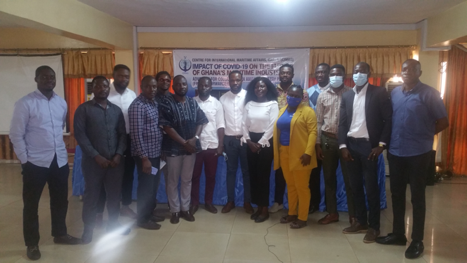
Centre for International Maritime Affairs, Ghana (CIMAG), an advocacy group, is challenging freight forwarders to take advantage of digitization so that they become relevant in the maritime sector to push the industry forward.
Recognizing their key role in revenue mobilization and national development, the group charged the freight forwarders to learn IT skills, take regular training seriously and continue to improve and these would help them keep pace with changing times.
Rev. Gabriel Fiatui, a Consultant at CIMAG said: “ICT plays an important role in freight forwarding business and therefore youshould have a united front to current development of the system and build your capacities so you could work in the comfort of your homes and offices. Training is key. For you to be relevant in the age of digitization, you have to be ready to train yourselves. This time we have to appreciate technology and be willing to learn it,” he said.
This was brought to light when CIMAG brought together freight forwarders in Tema to have an in-house discussion and brain storm on possible solutions to move the industry to an enviable level.
Dr. Bismarck Ameyaw, Research and Advocacy Director for CIMAG, said the role of freight forwarders in trade facilitation and in sustaining of the sector cannot be taken for a ride.
A feasibility analysis conducted by CIMAG reflects what is going on in the maritime sector and Dr. Ameyaw concluded that the COVID-19 has had a significant impact on financial structure, operational efficiency, sales and marketing performance on freight forwarding business.
“Invest in sales marketing in order to build an effective operational structure. Take it as an investment but not an expense and target the capabilities that matter the most and used that to your own competitive advantage,” he urged.
Frimpong Romeo, a member of the monitoring team of the Ghana Institute of Freight Forwarders (GIFF) and a participant indicated that the call to digitisation is in the right direction in as much as the COVID-19 had some kind of impact on them.
“One of the positive impact in relation to trade facilitation is our movement from paper works to online activities. It has come to stay and we are supposed to do it so we should not allow ourselves to be exploited by some of these shipping lines. Where ever they take you to, you should take advantage of digitizatition even on our phones.
Before, we were walking to their offices to do our releases but now we are forced to submit our trade document which is being required of the shipping lines to be released online and we are all trying as much as we can to do our best and join the digitization,” he said.
Daniel Lord, Co-Founder and Director of CIMAG appealed to system developers in the port to consult freighters and let them know the process flow as to how it goes, adding that most of the systems they are using in the port currently are not user friendly.









